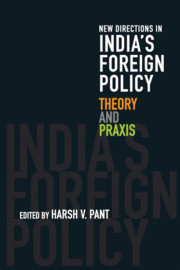Book contents
- Frontmatter
- Contents
- Preface
- 1 Introduction
- Part I Theoretical Evolution
- Part II Emerging Themes
- 7 Non-Alignment and Beyond
- 8 India and Multilateralism: Concepts, New Trajectories and Theorizing
- 9 India and the Responsibility to Protect
- 10 India and the Indo-Pacific Discourse
- 11 India and Nuclear Deterrence
- 12 India and Its Diaspora
- Bibliography
- Contributors
- Index
8 - India and Multilateralism: Concepts, New Trajectories and Theorizing
from Part II - Emerging Themes
Published online by Cambridge University Press: 13 November 2018
- Frontmatter
- Contents
- Preface
- 1 Introduction
- Part I Theoretical Evolution
- Part II Emerging Themes
- 7 Non-Alignment and Beyond
- 8 India and Multilateralism: Concepts, New Trajectories and Theorizing
- 9 India and the Responsibility to Protect
- 10 India and the Indo-Pacific Discourse
- 11 India and Nuclear Deterrence
- 12 India and Its Diaspora
- Bibliography
- Contributors
- Index
Summary
In Asia it seems inevitable that two or three huge federations will develop. […] India is going to be the centre of a very big federation.
Jawaharlal Nehru, 1946[The] BJP believes a resurgent India must get its rightful place in the comity of nations and international institutions. The vision is to fundamentally reboot and reorient the foreign policy goals, content and process, in a manner that locates India's global strategic engagement in a new paradigm and on a wider canvass, that is not just limited to political diplomacy, but also includes our economic, scientific, cultural, political and security interests, both regional and global, on the principles of equality and mutuality, so that it leads to an economically stronger India, and its voice is heard in the international fora.
Bharatiya Janata Party, Election Manifesto, 2014Introduction
From being a leading member of the Non-Aligned Movement (NAM) to being one of the largest contributors to peacekeeping troops in the United Nations (UN), from being a member of the largest regional organization in the world in terms of population (South Asian Association for Regional Cooperation, SAARC) as well as territorial scope (Indian Ocean Rim Association, IORA), the Indian approach towards and involvement in multilateralism has an impressive history and trajectory. Today, major changes in India's role in multilateralism are underway, making India's present-day role in multilateralism an intriguing work in progress.
India's historical ‘tryst’ with multilateralism started when India sent a delegation – albeit as part of the British delegation – to the United Nations Conference on International Organisation (UNCIO), responsible for drafting the UN charter in 1945. Since then, India has shown a virtually unwavering commitment to the principles and concomitant obligations stipulated in the UN charter.
At independence, India's international position was weak, her financial and military resources low. After independence, multilateralism under the framework of the UN was consequently used by India as a means of protecting her hard-won sovereignty as well as strengthening the economy, while at the same time coming to realize that fora like the UN were in no small measure used as an arena for continuing great-powers politics. Still, whenever possible India used global multilateralism to exert influence and impress upon the world her idiosyncratic normative and universalist approach.
- Type
- Chapter
- Information
- New Directions in India's Foreign PolicyTheory and Praxis, pp. 149 - 171Publisher: Cambridge University PressPrint publication year: 2019



